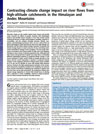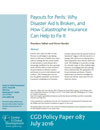-
The Unpredictability of Climate Impacts on River Flows, and the Need for Disaster Aid Reform
September 9, 2016 By Lynae Bresser A study published in PNAS highlights the unpredictability of the impacts of climate change on water resources by comparing detailed simulations in mountain areas of Chile and Nepal. Authors Silvan Ragettli, Walter W. Immerzeel, and Francesca Pellicciotti study the response of river flows to a significant decline in glacier areas in the Juncal catchment of Chile and the Langtang catchment of Nepal at higher spatiotemporal resolutions than any previous study. In the Andes, a 40 to 60 percent predicted decrease in runoff by 2091 to 2100 compared to levels from 2001 to 2010 is projected to lead to water shortages in nearby communities that depend on meltwater during dry summers. In contrast, a 15 to 70 percent predicted increase in post-monsoon river flows in the Himalayas during the first half of the 21st century is projected to intensify flood conditions for downstream communities. The authors call for more small-scale data collection, stating that “smart integration of field-based studies with the catchment scale at key basins in the world has great potential and can reveal the full magnitude of the impacts of climate change on mountain water resources.”
A study published in PNAS highlights the unpredictability of the impacts of climate change on water resources by comparing detailed simulations in mountain areas of Chile and Nepal. Authors Silvan Ragettli, Walter W. Immerzeel, and Francesca Pellicciotti study the response of river flows to a significant decline in glacier areas in the Juncal catchment of Chile and the Langtang catchment of Nepal at higher spatiotemporal resolutions than any previous study. In the Andes, a 40 to 60 percent predicted decrease in runoff by 2091 to 2100 compared to levels from 2001 to 2010 is projected to lead to water shortages in nearby communities that depend on meltwater during dry summers. In contrast, a 15 to 70 percent predicted increase in post-monsoon river flows in the Himalayas during the first half of the 21st century is projected to intensify flood conditions for downstream communities. The authors call for more small-scale data collection, stating that “smart integration of field-based studies with the catchment scale at key basins in the world has great potential and can reveal the full magnitude of the impacts of climate change on mountain water resources.” The current model for disaster relief often leads to aid that is “too unpredictable, too little, or too late,” according to a policy paper published by the Center for Global Development, a non-profit think tank focused on international development. Authors Theodore Talbot and Owen Barder write that as disasters occur more frequently due to climate change and greater numbers of people concentrate in vulnerable areas, the pressure on ex-post financing arrangements will only increase. They suggest that a preemptive model that spreads risk, such as the implementation of catastrophe bonds to transfer risk from sponsors to investors, could provide a “win-win-win” of timely, life-saving payouts, lower the cost of future hazards, and relieve pressure on NGOs, donors, and multilateral aid agencies. Pilot programs in sub-Saharan Africa, the Pacific, and the Caribbean show governments and the insurance industry are looking for new ways to deal with disasters. If these parametric insurance programs – which trigger payouts after certain thresholds are reached as opposed to waiting for assessments – are linked to incentives for risk prevention and investments in resilience, they could ultimately “save many more lives for much less money.”
The current model for disaster relief often leads to aid that is “too unpredictable, too little, or too late,” according to a policy paper published by the Center for Global Development, a non-profit think tank focused on international development. Authors Theodore Talbot and Owen Barder write that as disasters occur more frequently due to climate change and greater numbers of people concentrate in vulnerable areas, the pressure on ex-post financing arrangements will only increase. They suggest that a preemptive model that spreads risk, such as the implementation of catastrophe bonds to transfer risk from sponsors to investors, could provide a “win-win-win” of timely, life-saving payouts, lower the cost of future hazards, and relieve pressure on NGOs, donors, and multilateral aid agencies. Pilot programs in sub-Saharan Africa, the Pacific, and the Caribbean show governments and the insurance industry are looking for new ways to deal with disasters. If these parametric insurance programs – which trigger payouts after certain thresholds are reached as opposed to waiting for assessments – are linked to incentives for risk prevention and investments in resilience, they could ultimately “save many more lives for much less money.”Sources: Center for Global Development, PNAS.
Topics: Africa, Caribbean, Chile, climate change, disaster relief, environment, funding, Latin America, Nepal, Reading Radar, South Asia, water
 A Publication of the Stimson Center.
A Publication of the Stimson Center.





